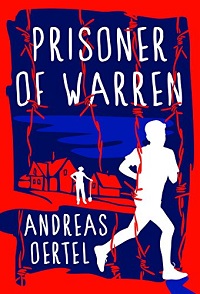| ________________
CM . . .
. Volume XXII Number 39. . . .June 10, 2016
excerpt:
It's July, 1944, and 13 year old Warren knows one thing: he hates the Germans and can't wait to fight them for himself. His opportunity comes sooner than he thinks when his father engages a German prisoner of war to help out on their family farm in New Brunswick. Warren is incensed, so much so that he and his friend Tom convince each other that the Nazi must die. Martin, the German soldier, doesn't fit Warren's conception of a Nazi though. He is a normal looking young man who turns out to share Warren's passion for sprinting. After the two are the targets of some truly evil local bullies, they become friends, and Martin begins coaching Warren to become a better sprinter. The story is told in very lively first person narration. Warren has an engaging voice, and he is a likable character. He's young and fairly naive, and the lessons he learns along the way in this story make him a more complex and rounded person, someone who is moving towards adulthood. It is an effective depiction of innocence and a boy whose small world is just about to become bigger. The family relationships seem very authentic because it's the 1940s, Warren doesn't talk back, and he doesn't really question his parents. He makes it clear that he thinks it is crazy for his father to engage a German to live with the family (to sleep in the same room as Warren!), but his father is the head of the household and his word is the law. The rural setting comes to life, both in terms of time and place, without the authorís forcing historical details into scenes where they don't belong. Warren has friends, but his closest relationship was with his older brother Pete who had died of polio a few years earlier. This relationship is kept alive through imaginary mental letters that Warren composes to Pete. Whenever he is troubled, he directs his feelings in this manner, and it helps him focus his thinking. Pete writes back. Of course, Warren knows that it is not really Peter, but he channels his own knowledge and all the things he has learned from his brother into the responses. Very often it is Pete's plans which get Warren and Martin out of trouble. The letters are an excellent plot device and also a way to shed light on Warren's interior life and feelings. He doesn't have to say that life is tough and that he misses his brother as it's all embedded within this clever, and often funny, correspondence. Perhaps the most interesting and substantial aspect of the book is its attempt to probe the fuzzy gray areas of war. World War II is often portrayed as morally unambiguous, but questions of the internment of Japanese Canadians or the treatment of prisoners of war are a way to break up this simplistic view. It is always important to remind young people that, even when they or their nation have enemies, not every person agrees with the policies that they may be forced to fight for. The conversations in the book aren't that complex, but they are probably effective for a younger audience. Older readers might find the way that the themes are explored to be a little clunky. Even though Prisoner of Warren is a book for fairly young readers it certainly has moments of darkness. There are the serious issues of war and death, but there is also the characters of the bullies, especially Rake, who is more of a sociopathic criminal than a traditional bully. This might be a bit much for a middle grade novel. Rake is an arsonist and a would be murderer, and Warren and Martin need all their wits to actually make it out of the book alive. The scenes where Martin teaches Warren about sprinting are very precise and believable. Martin teaches Warren about how to push off the blocks, how to focus, how to listen for the starter's pistol. The fact that both are top runners, though, is rather a coincidence. Martin helps Warren train for the New Brunswick Summer Games in Moncton which take place after Rake has attacked and seriously injured Martin. Warren runs anyway, as he knows it is what Martin would want. In some ways, this is the big climax Warren learns to focus and use all of his new found knowledge to win the race. But it is a slight letdown as the race comes and goes in a few short pages and is sandwiched between two dramatic and violent incidents. Running is a bit of a footnote here and could have perhaps been developed and integrated into the story even more. Prisoner of Warren (not sure about the pun!) is a simple, easy read with a lot of good dialogue which will appeal to boys but might not have too much crossover for female readers. The tale works both as a suspenseful adventure and as a story about an unlikely friendship. Prisoner of Warren is not the most sophisticated novel, but it is successful in its scope and is well developed in its themes and characters. Recommended.
Kris Rothstein is a childrenís book agent and reviewer in Vancouver, BC.
To comment on this title or this review, send mail to cm@umanitoba.ca.
Copyright © the Manitoba Library Association. Reproduction for personal use is permitted only if this copyright notice is maintained. Any
other reproduction is prohibited without permission.
CM Home |
Next Review |
(Table of Contents for This Issue - June 10, 2016.)
| Back Issues | Search | CM Archive
| Profiles Archive |
